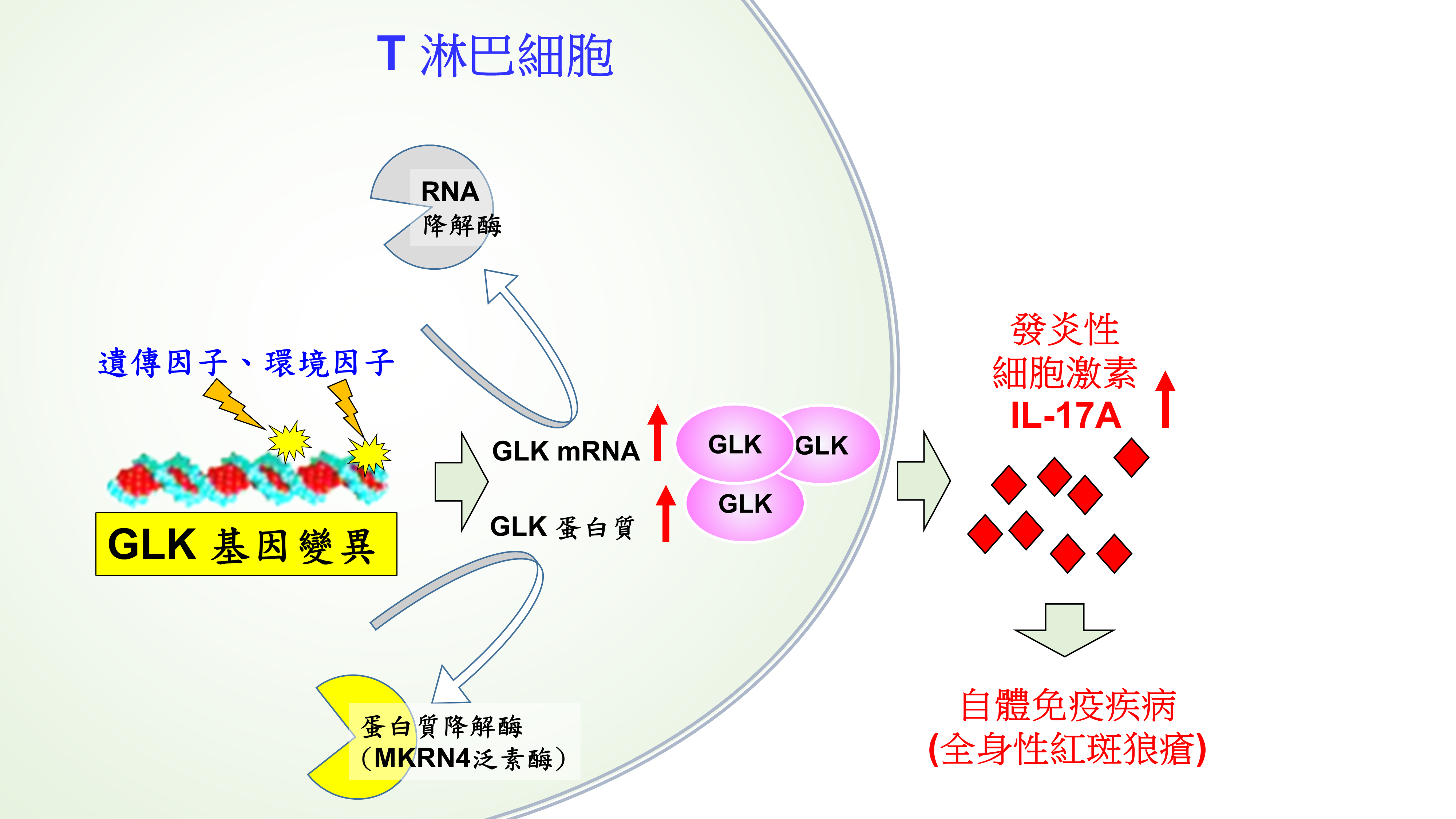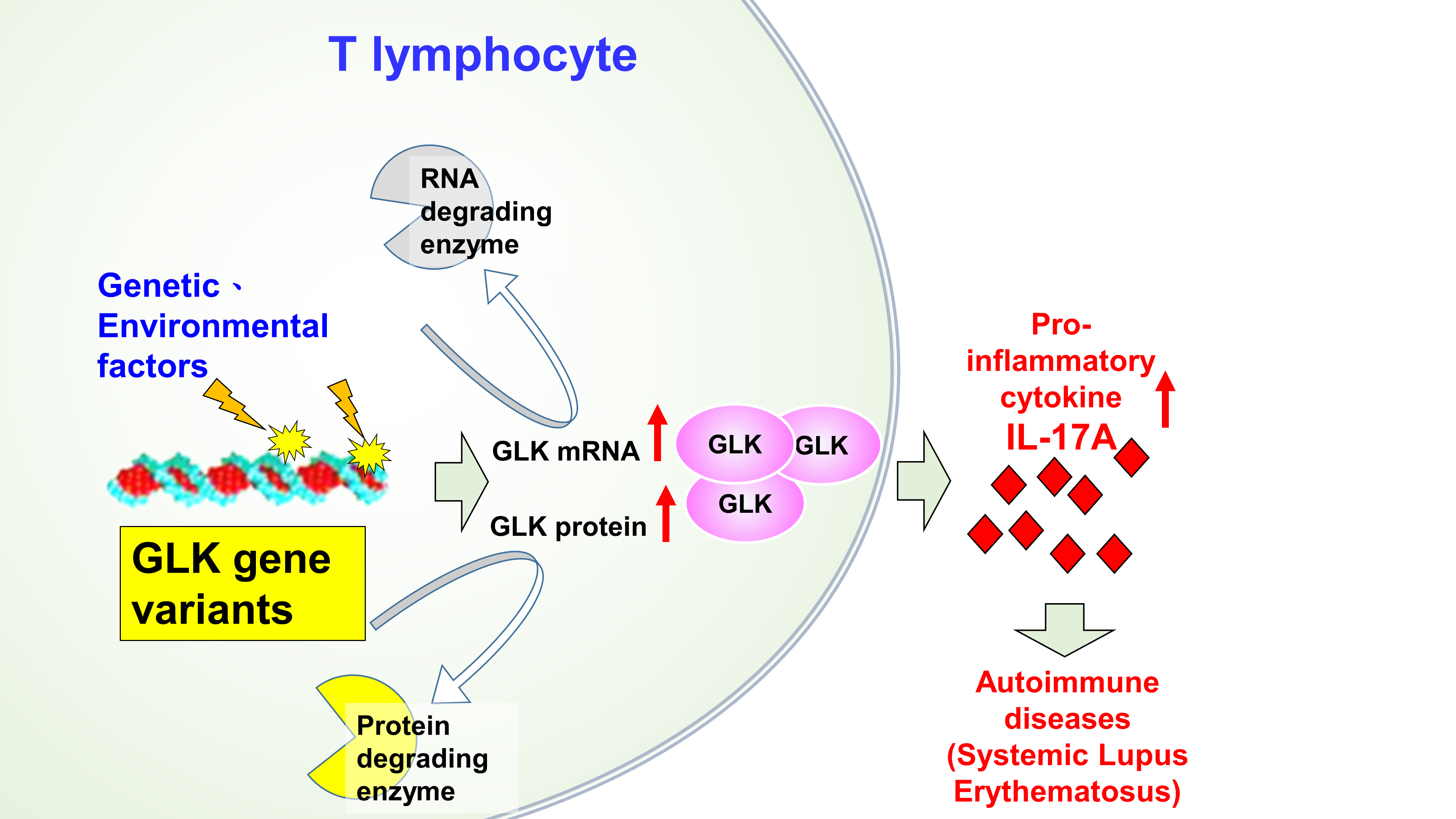全身性紅斑狼瘡基因變異之新發現
全身性紅斑狼瘡基因變異之新發現
人類在演化過程中由於受到各種因素影響,可能造成基因突變。遺傳基因源自親代生殖細胞若發生突變會遺傳到下一代,稱為生殖細胞系突變 (germline mutation) 或基因組突變 (genome mutation),另外,在人體生長過程中,大部份的體細胞會不斷地分裂,在分裂的過程中也有可能造成基因突變稱為體細胞突變(somatic mutation),而體細胞突變一般不會遺傳到下一代個體。
全身性紅斑狼瘡的病因很複雜,和多種不同的遺傳基因有關,但是過去的研究主要偏重在基因組的研究,而少有關於體細胞變異的報導。GLK基因會影響免疫系統,促進發炎物質的產生,導致自體免疫疾病的發生。本研究除了探討全身性紅斑狼瘡病人是否有GLK的基因組突變外,另外也要探討是否有GLK的體細胞基因變異。
本研究共包括全身性紅斑狼瘡病人181名和正常人250名(其中93名為正常健康人,157名為病人家屬),分成二組不同的組合。分別抽取其周邊血液單核球,利用次世代分析方法,探討GLK基因在基因體和體細胞的變異情形。
本研究結果顯示58名全身性紅斑狼瘡病人有GLK之體細胞基因變異,且這些病人血清中有較高的anti-dsDNA抗體濃度和較低的補體C3和C4 (表示病人有較高的疾病活動度),另外,本研究亦發現數人基因組中有數種新的GLK基因變異。功能性的研究亦顯示這些GLK的基因組和體細胞變異會導致GLK增加,並且和紅斑狼瘡的致病有關。
圖形摘要

應用與亮點:
1. 本研究是第一篇發現GLK基因變異和全身性紅斑狼瘡的致病有關。
2. 過去有關全身性紅斑狼瘡致病基因的研究主要偏重在具有遺傳特性之基因組變異,少有論文探討體細胞的
基因變異,本研究則是同時探討全身性紅斑狼瘡遺傳性和體細胞之基因變異。
3. 本研究結果有助於全身性紅斑狼瘡的診斷與治療。
【研究團隊】
團隊成員:顏正賢(高醫),莊懷佳、譚澤華(國衛院)、洪維廷、陳一銘、藍忠亮(中榮)
代表單位:高醫臨床醫學研究所、高醫附院過敏免疫風濕內科
團隊簡介:本研究是由高醫、國衛院和中榮共同合作完成。本校過敏免疫風濕內科團隊多年來一直致力於探討自體免疫疾病的致病機轉及其病因,包括遺傳基因、表現基因和環境因素。目前仍持續和校內外學者合作研究中。
研究聯繫Email: jehsye@kmu.edu.tw
【論文資訊】
論文出處:Annals of the Rheumatic Diseases. Feb 2022. Vol 81, Issue 2
全文下載:http://dx.doi.org/10.1136/annrheumdis-2021-221010
Novel Germline and Somatic Mutations in Systemic Lupus Erythematosus
Novel Germline and Somatic Mutations in Systemic Lupus Erythematosus
Over the course of evolution, it is possible for human beings to acquire genetic mutations through various mechanisms. Mutations that occur in reproductive (germline) cells are called germline mutations or genome mutations, which can then be passed down to descendants. In addition, most cells in the human body divide over the individual's lifetime. Mutations that occur during the division of body (somatic) cells are called somatic mutations, which will not be passed down to descendants.
The etiology of systemic lupus erythematosus (SLE) is complicated. Many genes have been reported to be involved in the pathogenesis of SLE. Previous studies have usually focused on genomic mutations, while studies concerning somatic mutations have been very rare. The GLK gene may influence the immune system and promote the release of pro-inflammatory substances, which may result in the development of autoimmune diseases. The purpose of this study is to investigate mutations in the GLK gene in the germline, as well as somatic, cells.
This study enrolled 181 SLE patients and 250 controls. The genomic and somatic mutations of the GLK gene were investigated in the peripheral blood mononuclear cells of patients and controls by using next-generation sequencing. This study showed that 58 SLE patients had a somatic mutation in the GLK gene. These patients have a higher serum anti-dsDNA antibody as well as lower C3 and C4 levels, indicating higher disease activity. Several novel genomic mutations were also noted in SLE patients. The functional study demonstrated that genomic and somatic mutations of the GLK gene will induce increased expression of GLK, which are related to the development of SLE.
Graphical Abstract

Application and Highlights:
1.This is the first study to show a link between genomic or somatic GLK mutations and increased risk of SLE.
2.Previous genetic studies of SLE are primarily focused on genomic mutations. The present study not only focuses on genomic mutations but also on somatic mutations.
3.The results of this study will contribute to the diagnosis and treatment of SLE.
Research Team Members:
Jeng-Hsien Yen (Kaohsiung Medical University); Huai-Chia Chuang, Tse-Hua Tan, Pu-Ming Hsu (National Health Research Institute); Wei-Ting Hung, Yi-Ming Chen, Joung-Liang Lan (Taichung Veterans General Hospital)
Representative Department:
Graduate Institute of Clinical Medicine, College of Medicine, Kaohsiung Medical University; Division of Allergy, Immunology, and Rheumatology, Department of Internal Medicine, Kaohsiung Medical University Hospital
Introduction of Research Team:
This study was a collaboration among Kaohsiung Medical University, National Health Research Institute, and Taichung Veterans General Hospital. The research team of the Rheumatology Division of Kaohsiung Medical University devotes itself to the study of the pathogenesis of autoimmune diseases, especially in the fields of genetics, epigenetics, and environmental factors. We regularly collaborate with other investigators to achieve breakthroughs.
Contact Email:
jehsye@kmu.edu.tw
Publication:
Annals of the Rheumatic Diseases. Feb 2022. Vol 81, Issue 2
Full-Text Article:
http://dx.doi.org/10.1136/annrheumdis-2021-221010


